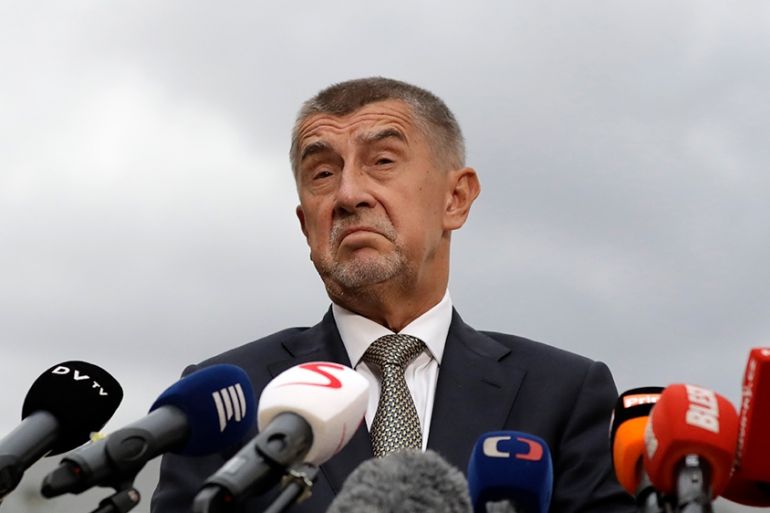Why is the Czech government in crisis and will it collapse?
Corruption allegations target PM but immediate risk to government eases as coalition partner withdraws serious threat.

The Czech government remains stuck in a crisis that has already rumbled on for two months, even after a junior coalition partner backed down on an ultimatum that threatened a collapse by the end of the month.
The move by the Social Democrats (CSSD) on Thursday averted the immediate threat to the minority coalition led by Prime Minister Andrej Babis’s populist Ano party. The CSSD had threatened to leave the government unless President Milos Zeman confirmed its new nominee for culture minister by July 31, a demand the head of state rejected on Wednesday.
The CSSD first requested Antonin Stanek be replaced by Michal Smarda in May. Leader and Deputy Prime Minister Jan Hamacek insists there is no reason for the party to remain in the government if it cannot freely nominate its five ministers.
Under the constitution, the president must sign off on cabinet appointments. While Zeman said on July 23 that he will finally dismiss Stanek on July 31, he added that he will not appoint a new minister until mid-August.
That raised speculation of imminent government collapse, but the CCSD’s Hamacek – facing internal party splits and weakened public support – told a press briefing that he would not enforce his deadline.
“We will wait for the president’s decision,” spokeswoman Barbora Kalatova told Al Jazeera. “We hope that the situation will be resolved by the end of August.”
Known for his links to Russia and China, as well as outrageous rhetoric targeting Islam, Roma and liberal values, Zeman has sought to expand the largely-ceremonial powers of his post since winning the Czech Republic’s first-ever direct presidential election in 2014.

A wily political operator, he notes that the constitution imposes no time limit on him to comply with the request.
The Senate, the upper house of parliament, has voted to charge Zeman with violating the constitution, but the motion is unlikely to garner the necessary 120 votes in the 200-seat lower house, which is on holiday now.
“Zeman has a strong fan club in the Chamber of Deputies,” said Jakub Michalek, head of the parliamentary faction of the Pirate Party – Czechia’s second-largest opposition force. “Plus of course Ano will oppose the motion.”
Babis, who is alleged to have sealed a power-sharing pact with Zeman ahead of his election as prime minister in 2017, has refused to confront the president in support of his coalition partner. The billionaire industrialist has been weakened in recent weeks by accusations of conflict of interest regarding European Union funds and massive street protests.
Zeman is manufacturing this crisis because he knows the parliamentary parties are too weak to oppose him.
In addition, a presidential pardon could be the billionaire’s last chance to avoid jail should state prosecutors decide next month to press criminal charges against him in a decade-old fraud case also connected to EU funds.
“The prime minister has lost the aura of a strong leader who will arrange everything alongside the president,” the liberal weekly Respekt noted in an editorial.
Government spokeswoman Jana Adamcova told Al Jazeera that Babis had departed on holiday and would make no comment.
Despite these troubles, Ano retains a large lead in opinion polls. That’s partly thanks to recent rises in social spending, but also stems from a weak opposition.
Corruption and cronyism have decimated support for the country’s traditional mainstream parties over recent years.
“Zeman is manufacturing this crisis because he knows the parliamentary parties are too weak to oppose him,” said Jiri Pehe, a political analyst and director of New York University’s academic centre in Prague.
Babis, who has systemically drained support from the CSSD over the past two years, has urged the centre-left party to remain in government. Hamacek, aware of his party’s weak position, is unwilling to jump.
While the imminent risk of a government collapse has receded, the crisis remains.
Analysts expect Zeman to offer further provocation before parliament reconvenes in September, and they worry that his push for power could threaten Czech democratic institutions and even the country’s Western orientation.
Should the government collapse, Babis would likely be left to lead a new minority government reliant on the far-right SPD and communist KSCM for parliamentary support.
This is clearly Zeman’s preferred option, suggested Pehe; “He wants to be able to dictate terms.”
The president holds sway within both parties, which would seek significant influence over government policy in return for propping up Babis. Exits from the EU and NATO are among their main policy goals.
